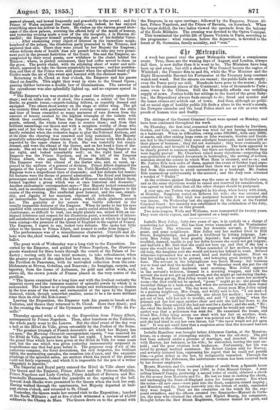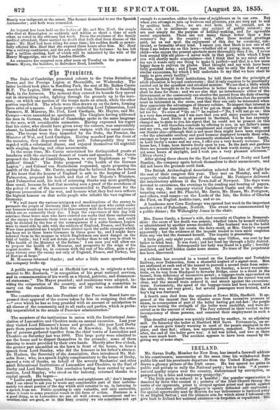tt 311ttropulte.
A week has passed over the great Metropolis without a conspicuous event. True, these are the waning days of August, and London, always dull then, is now duller than it is wont to be. The Ministers have long been up and away, but still a shadowy War Council haunts the region of Whitehall ; the Premier flits to and fro, while the War Minister and the Right Honourable Baronet his Fortunatus at the Treasury keep constant watch and ward. But the streets are vacant ; the public halls are empty ; even the Peace party are still. Hundreds have gone to the moors ; thou- sands to the pleasant places of the Continent ; tens of thousands to Paris ; some even to the Crimea. Still the Metropolis affords one unfailing supply of news. Justice holds her sittings in the heart of the great Baby- lon ; the Stipendiary always finds enough to do; fraud and murder and the lesser crimes are seldom out of town. And thus, although no politi- cal or social sign of healthy public life finds a place in the week's anima; the Newgate calendar and the local Police sheet are as rife as ever with proofs of human vice and frailty.
The sittings of the Central Criminal Court were opened on Monday, and have been continued throughout the week..
On Thursday, the first trial connected with the great frauds by Davidson. Gordon, and Cole. came on. Gordon was tried for not having surrendered as a bankrupt. When in difficulties, owing some 600,0001., with only 20001. of assets, and after raising large sums on false warrants, Gordon and David- son fled to the Continent; they were adjudged bankrupts, and notices left at their places of business ; they did not surrender ; they were eventually, ar- rested abroad, and brought to England as prisoners. The facts appeared to be clearly proved to common minds; but there are doubts as to whether they were legally proved : Mr. Chambers raised many objections—respecting the non-production of original documents in bankruptcy, the serving of notices, mistakes about the county in which West Ham is situated, and so on ; and Mr. Justice Erie took notes of them, against the event of further legal argu- ment. Mr. Chambers also contended that there was no proof that Gordon fled from this country to avoid surrendering as a bankrupt. Mr. Justice Erle summed-up unfavourably to the accused; and the Jury soon returned a verdict of "Guilty."
As the evidence against Davidson was the same as that in Gordon's case, and as the same objections would be raised and reserved for consideration, it was agreed on both aides that all the other charges should be postponed.
A year ago, one Turton was strangled in his sleep, when heavy with drink, at Bromley. Suspicion rested on Rebecca his wife ; she was arrested and committed for trial. Her trial was postponed because it was surmised she was insane. On Wednesday last she appeared in the dock at the Central Criminal Court : her insanity was established to the satisfaction of the Jury, and they acquitted her on that ground.
Two note-forgers, Wells and Williams, were transported for twenty years. They were clever rogues, and had operated on a largo scale.
Isabella Mary Jolley, forty-two years of age, is in custody on a charge of murdering her mother. She has been twice examined at the Westminster Police Court. The witnesses were her domestic servant, a Police-ser- geant, and some neighbours. Miss Jolley and her mother lived in Hill Street, Knightsbridge, and gained a livelihood by letting lodgings. Lat- terly Miss Jolley had been greatly dejected ; had complained of being troubled, dunned, unable to pay her debts because she could not get lodgers; and had told a Mr. Bird that she could not bear up, and that if she had a razor she would cut her throat. When reminded of her mother, a helpless old lady, the daughter said she would not leave her behind to want. Several witnesses represented her as a most kind and dutiful daughter. Next we find her taking a razor to be ground, and betraying great anxiety to get it done. The servant in the lodgingliouse was Sarah Mossop : her business was to tend and feed the mother • and on Wednesday week she put the old lady to bed. About daybreak next morning, Miss Jolley appeared in the servant's bedroom, dressed in a morning wrapper, and told the servant she need not get up until seven, and she might go out during the day. When Mossop got up, Miss Jolley would not allow her to enter her mother's. room—the door could not be opened, "pussy" might go in : she placed the breakfast things in a back-room, and when she returned to wash them found both cups had been used. The day wore on. About noon Mina Jolley called in a passing neighbour, Mrs. Crapp, and wildly said to her, "I am mad—I am almost mad"; talking obscurely also about her mother ; how she bad got out of bed, told her not to trouble, and said "I am dying," when the prisoner put her feet upon another chair and said she laid her down to die quietly. Mrs. Crapp asked if she had not sent for a doctor; and she said, "No ; she owed the doctor a little bill, and she supposed he would not come." The upshot was that a policeman was sent for. He examined the home, and found Mrs. Jolley lying across one chair with her feet on another, dead, from a gash in the throat. The razor was pointed out by Miss Jolley ; who said she had tried to cut her own throat, but "the razor would not act upon her." It was not until later that a suspicion arose that the deceased had not. committed suicide.—Remanded.
Isabella Hamilton was brought before Alderman Carden, at the Mansion- house, on a charge- of attempting suicide. It was the old story. The girl had been seduced under a promise of marriage and deserted. She lived with Harvey, her betrayer, as his wife; he absconded, leaving the rent un- paid ; and the poor creature took laudanum. Fortunately, her life was saved by prompt medical assistance. Sir Robert Carden sent for Harvey, and severely lectured him, expressing his regret that he could not punish him,—a great defect in the law, he indignantly remarked. Through the intercession of the Alderman, the unfortunate woman has been received back by her former employers. Messrs. Murrieta and Co. received a letter of credit from a Spanish house in Valencia, desiring them to pay 11001. to John Manuel Campo. A man calling himself Campo, producing a second letter of credit, obtained a check for the money from Murrieta and Co. He lost no time in cashing the check, and exchanging the Bank-of-England notes for foreign money. But when the notes—all new ones—were paid into the Bank, suspicion caused inquiry ; and Murrieta and Co. looking narrowly into the letters of credit, concluded they were forged. They set the constables on the watch for the sup- posed swindlers, and the officers arrested two Spaniards—Manuel de Corte- zor, the man who obtained the check, and Miguel Massip, his companion. Brought before the Bow Street Magistrate, Cortazor denied his guilt, and
Massip was indignant at the arrest. The former demanded to see the Spanish Ambassador ; and both were remanded.
An inquest has been held on the bodies of Mr. and Mrs. Hoof, the couple who died at Kensington so suddenly and within so short a time of each other, as noted in the obituary last week. From the evidence of the family medical attendant, there seemed no doubt that both died from disease of the heart : Mr. Hoof had been ailing for some time; his sudden death so power- frilly affected Mrs. Hoof that she expired three hours after him. Mr. Hoof was a railway-contractor, and the sole architect of his fortunes: he has left half a million sterling, half of which will be inherited by the wife of Sir Henry Muggeridge, one of the London Sheriff's.
An extensive fire occurred soon after noon on Tuesday on the premises of Messrs. Myers, the builders, in Belvedere Road, Lambeth.

























 Previous page
Previous page